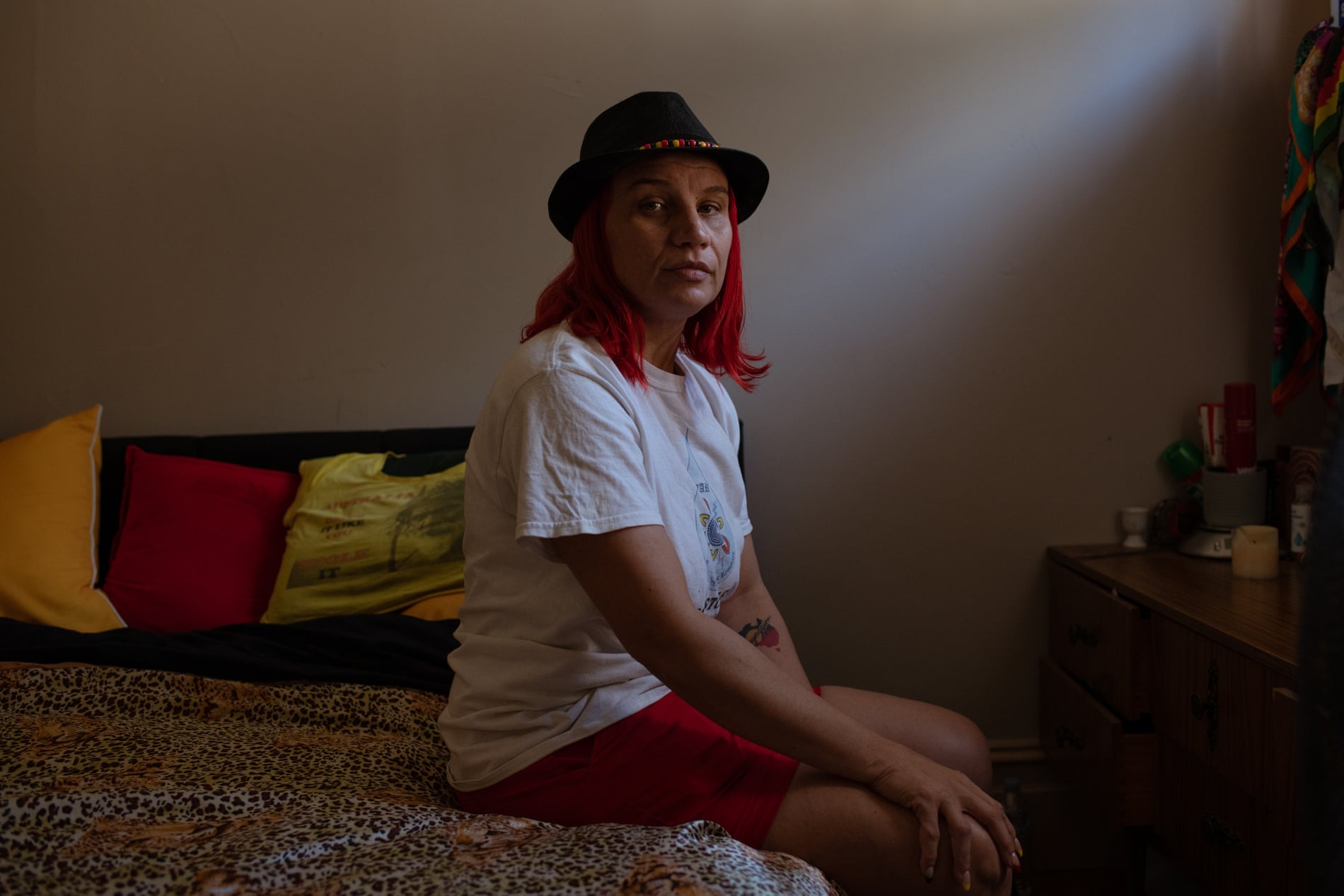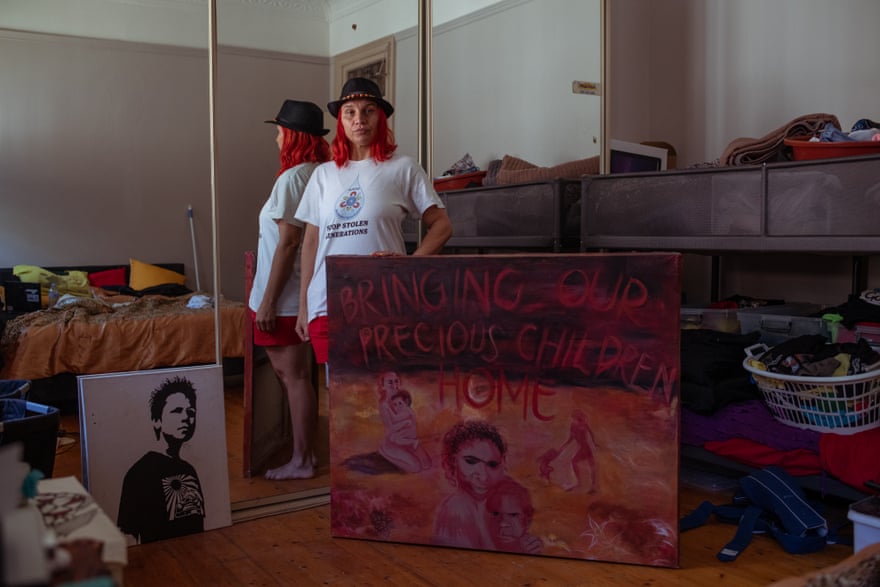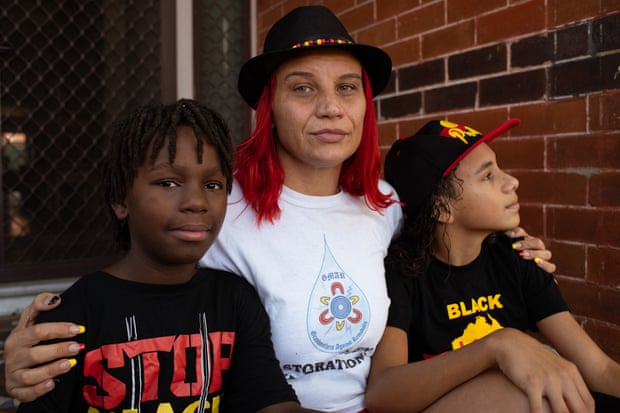
Indigenous children make up 41% of all kids in out-of-home care in NSW, while changes recommended three years ago have been ignored
When Lizzie Jarrett was 12 years old, she walked into her grandmother’s home and met a man she didn’t recognise.
“I thought, ‘Who’s this muscly, baldy-headed, strapping Aboriginal man?’” she tells the Guardian.
“Not realising, you know, it was my father, and that it was also me. I didn’t have that bond, not with him or my own people.”
In 1980s Australia, Jarrett, a Bundjalung Gumbaynggirr Dunghutti woman, had been placed in a series of foster homes – “white Christians mostly” – across New South Wales and Queensland after her parents’ marriage broke down.
“Shipped around like I was a commodity” from the age of about four to 12, she says.
When she was 12 she was placed in the care of her grandmother, who reintroduced her to the father she had been separated from as an infant.
“It was like, almost an out-of-this-world experience. It was overwhelming, heartwarming, heartbreaking. It was a complete culture shock. I find it hard to put into words,” she says.
It’s a story that has been repeated for generations of Aboriginal families in Australia, and it’s still happening today.
In 2019/20, 952 Aboriginal children across NSW were removed from their families, a 2.6% increase on the year prior. In total, there were 6,688 Aboriginal children in what is known as “out-of-home-care” – about 41% of the total number of kids in the system. This is despite Aboriginal children only making up 6% of Australia’s under-18 population.
At the same time, another 1,144 Aboriginal children in the state were on a “guardianship order”, a longer-term care arrangement where they remain in state care until the age of 18. Aboriginal children make up about 35% of that cohort.
The disproportionate use of separation powers on Aboriginal families is not a secret. Indeed, multiple reports have been commissioned to examine why it is happening.
The most significant of those was the Family is Culture report. Commissioned by the NSW government in 2016, the report’s author, Prof Megan Davis, a Cobble Cobble woman, constitutional lawyer and public law expert, examined the case files of 1,144 Aboriginal children between 2015 and 2016.
Her findings, released in 2019, described a system not only in deep chaos, but often in breach of its own laws. The report found that at times “children who did not appear to be at risk of harm were removed from their families” by department caseworkers who “regularly” provided “false or misleading” evidence to the children’s court.
Her recommendations were sweeping. The government, she said, should introduce an independent Child Protection Commission to oversee the child protection system, the adoption of Aboriginal children in out-of-home care should be banned, and funding in the system should be redirected to early intervention.
Three years later though, leaders within the sector say the government is sitting on its hands and Davis, a pro vice-chancellor at the University of NSW, is disillusioned with the response to her report, describing it as an “incredibly disappointing”.

“[The] recommendations as a whole are not being adequately implemented,” she tells the Guardian.
“Key foundational reforms such as those aimed at increasing independent oversight of the system have been ignored, while the updates provided by the minister in 2021 show that many recommendations remain in preliminary ‘scoping’ stage or are said to be ‘in progress’. After all this time, this is unacceptable.”
The government says it has made progress, including completing reviews on 97% of the 3,000 individual case recommendations made by Davis. But structural reforms underpinning the report have so far been ignored.
Until now the government has said it would delay considering any recommendations requiring legislative change until a review in 2024, something Davis calls “incredibly distressing”.
“There are many aspects of the child protection system that are flawed and in need of reform,” she says.
“The decision-making around removals is flawed, the training and qualifications of case workers is inadequate, the department’s record keeping is abysmal, the implementation of the Aboriginal child placement principle is problematic, the removal of newborns in hospitals is traumatic and dangerous, and the Crown’s failure to be a model litigant in child protection cases is deeply worrying.”
A new push for reform
A bill to be introduced in the lower house of the NSW parliament next week will seek to change that.
If passed, it will – for the first time – require magistrates to “presume” an inherent harm in removing a child from their family, including a “serious harm arising from disrupting the child or young person’s connection to his or her culture”.
It also seeks to force a reallocation of funding towards prevention by “mandating the provision of support services to prevent entries into care”, and allow courts to dismiss applications for care orders in circumstances where the department cannot show it had considered “alternatives”.
Successive governments have broken countless promises to stop tearing families apart
Greens MP David Shoebridge
Based on Davis’s recommendations and drafted with the support of groups such as the Aboriginal Legal Service and the state’s Aboriginal child and family peak organisation, AbSec, the bill was put forward by the Greens MP David Shoebridge. He says he drafted the bill after the government “refused to make these changes”.
“The fact we’re so close to passing this bill is thanks to the many First Nations mothers, grandmothers and advocates who have led this struggle for years,” Shoebridge says.
“We are committed to making these much-needed reforms law and we are grateful to the wide range of MPs who have stepped up as co-sponsors. This is a case of politics working.
“Successive governments have broken countless promises to stop tearing families apart – it has been 14 years since the apology, yet First Nations children are still being ripped from their families and deprived of their kin and culture.”
Last month, the bill sailed through the upper house with a coalition of supporters, including Labor, the Shooters, Fishers and Farmers party, the Animal Justice party, and Fred Nile’s ultra-conservative Christian Democrats.
The only opponents were One Nation and the government.
Natasha Maclaren-Jones, the minister for families and communities, has sought to address criticism of the government’s response to the report since taking on the portfolio in December, by committing to fast-tracking the review of some of the key recommendations.
While the government previously insisted it would wait until 2024 to review the recommendations requiring legislative change, Maclaren-Jones says she has instructed the department to begin work on some of those reforms.
“One area that the premier and myself have a focus on is closing the gap and, particularly in the Family is Culture report there were a number of things [where] I wanted to know what more we could do in addition to the review in 2024,” she says.
“Our aim is to take [reforms] to our parliament this year.”
But some changes remain off the table until 2024, including the key recommendation for an independent oversight body, something Maclaren-Jones says would remain “a long-term focus because it’s a complicated change”.
“It would require more consultation. What I’m looking at is what are the things that can be done to draft legislation sooner,” she says.
Maclaren-Jones insists the government will not support the Shoebridge bill because, she says, more consultation was required with the legal sector.
But key figures in the sector disagree. John Leha, the chief executive of AbSec, which is a member of the government’s Knowledge Circle, says that after several reviews of the sector have found systematic issues it is “insanity” for the government to ask for more consultation.
“The Family is Culture recommendations built in consultation,” Leha says.

“It was a comprehensive, independent, Aboriginal-led review of Aboriginal children in child protection. I do not agree there needs to be more consultation and it’s a reminder that in the two or three years since it was released there has been little to no progress on the report’s implementation.
“It is beyond frustrating, it’s insanity. It’s offensive.”
After the bill easily sailed through the state’s upper house, supporters are hopeful it will find its way through the NSW legislative assembly – even without government support.
The Guardian can reveal that carriage of the bill in the lower house will be taken not by the Greens, but by independent MP Greg Piper, while fellow independents Alex Greenwich and Joe McGirr, and the Shooters party MP Roy Butler, are among its co-sponsors.
Still, substantial barriers remain. After the bill passed the upper house One Nation MP Mark Latham appeared in the Daily Telegraph labelling the bill as a “paedophile’s picnic” because, he claimed, recognising harm in removals would prevent them from taking place in cases where they are warranted.
While supporters say that’s not true, the Guardian understands Labor will move more amendments when the bill comes to the lower house, confirming that recognition of the inherent harm of removals won’t stop them happening in cases where harm is already occurring.
‘Black mothers are still having their children stolen’
After she reconnected with her father as a 12-year-old, Lizzie Jarrett started to learn about her family’s history. He and his siblings, she discovered, were members of the stolen generations, removed from their mother’s care when they were children.
Today, she continues to see her story repeated over and over again. As an advocate for Aboriginal people caught up in the community justice system, she spends her days in courts across Sydney helping mothers seeking restoration orders or just to visit their children.
Or she’s at midwife appointments with pregnant women who have been the subject of what’s known in the sector as a “birth alert”, meaning the NSW Department of Communities and Justice is monitoring their pregnancy and, in some cases, will remove the child from their care at birth.
“It enrages me,” she says. “I’m a black mother, I have three sons; for all these years I have had to hold my breath and tick every single white box to make sure this didn’t happen to me, a third generation of the government taking my children.
“But I see how it still happens every day. We’re told the White Australia policy is gone, that we said sorry for the stolen generations. People think it’s all in the past, it’s OK now, get over it. Until you learn this is the reality today. Black mothers are still having their children stolen.”
